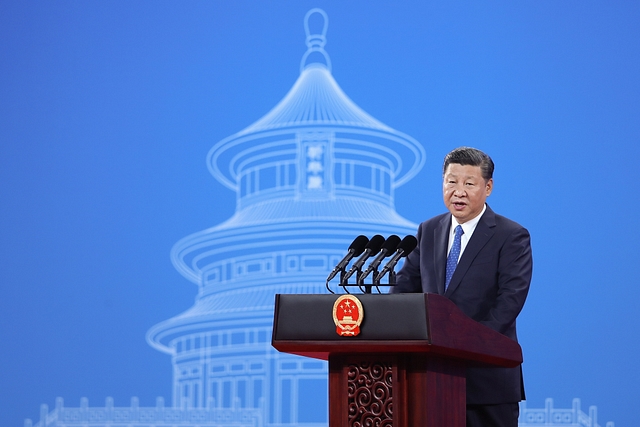
Xi Jinping Revamps People’s Liberation Army Ahead Of CPC Congress
Chinese President Xi Jinping has reshuffled the top leadership of the powerful People’s Liberation Army (PLA), packing it with a new set of generals, vastly strengthening his power base in the world's largest military ahead of the Congress of the ruling Communist Party.
The reshuffle comes prior to the nineteenth Congress of the Communist Party of China (CPC) which will open here from 18 October. The meeting is widely expected to confer a second five-year term to Jinping as General Secretary.
Two top officials, General Fang Fenghui, head of the Joint Staff Department Central Military Commission (CMC), and General Zhang Yang, head of its Political Work Department have been removed in the latest shake up of the 2.3 million strong PLA, increasing Jinping's control over the military.
Jinping heads the all-powerful CMC – the overall high command of the PLA – and is the only civilian in the 11-member body. The "ousting" of Fenghu and Yang is further proof that he is "cementing his control over the military", the Hong Kong-based South China Morning Post reported today.
Fenghui has been replaced by General Li Zuocheng, a decorated veteran of the Sino-Vietnamese war and Admiral Miao Hua, formerly the PLA Navy's political commissar has been appointed as head of the Political Work Department in the place of
Yang. Jinping promoted Zuocheng to full general and Hua to the equivalent naval rank in 2015 and both men are seen as being firmly in his camp, the Post report said.
He heads the Presidency and the military, which makes him far more powerful compared to his predecessor, Hu Jintao. In his first term, Jinping has carried out a massive anti-graft campaign in the party and the military in which thousands of officials from top to bottom were either punished or purged.
"Whatever option will be chosen, the first thing Xi will do is to root out the harmful influence left by the two disgraced CMC vice-chairmen, Guo Boxiong and Xu Caihou," the Post quoted an official as saying.
Boxiong and Caihou became the most senior military officers probed for buying and selling military ranks and other forms of corruption in the sweeping anti-graft campaign launched by Jinping soon after he became party general secretary in November 2012.
Since then, at least 13,000 military officers involved in corruption cases have been punished, the Post quoted a report by the PLA Daily, the official mouthpiece of the Chinese military as saying. Boxiong, 75, was sentenced to life imprisonment in July last year and Caihou died of cancer at the age of 72 in 2015 while in custody and under investigation for graft.
Since he took over Jinping's focus remained on revamping the military. In an unprecedented overhaul, he had announced that the PLA would shed 300,000 troops, taking their number down to two million.
He has also cut the size of the army to a million and vastly increased the role of the navy and the air force to assist China’s global push for influence. He had also scrapped the PLAs four former headquarters General Staff, General Political, General Logistics and General Armaments and established 15 functional departments to divide their powers. The PLAs seven military commands were also reshaped into five theatre commands.
Jinping will use the party congress to restructure the CMC, the Post quoted officials as saying. He may either trim the size of the 11-member CMC to just the chairman and four vice-chairmen or induct heads of the five theatre commands into the high power body.
The current CMC comprises one chairman, two vice-chairmen, and eight regular members: the defence minister, the heads of the four former headquarters, and the commanders of the air force, navy and rocket force.
"Rooting out the harmful influence of Guo and Xu is one of the key reasons Xi needs to reform the CMC," Beijing-based military expert Li Jie told the Post. The structure of the commission also needs to fit the ongoing military overhaul, with thousands of senior officers being laid off, he said.
"The removal Fang and Zhang and reform the CMC could remind his opponents that Xi has absolute dominance in the army, which helped put the Communist Party in power," he said. PTI